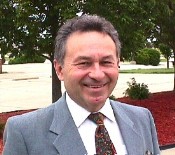"I
Was Not Ashamed to Ask
For Help For Our Children"
Dr. Pasechnik, who returned from visit to the United States
From the Chernihev News
October 1, 1999
Chernihev, Ukraine
An interview by Natalia Berehova
To begin with, we have a shocking statistic regarding our
children in Ukraine: we are having to treat 152,000 handicapped children. In our
city you will find nearly 1000 of these children. From the testimony of
pediatricians, we have a continual rise in untreatable illnesses that are linked
to the Chernobyl disaster.
We have to admit that we have built centers for
rehabilitating children in Ukraine. But, they are catastrophically too few for
our nation: only six for a population of 50,000,000.
|
|
One of those centers has a hopeful name – “Revival”
operates in Chernihev. The head of this center is Merited doctor of Ukraine,
enthusiast of his life’s work Vasyl Ivanovich Pasechnik.
He recently returned from a trip to the United States that
was organized and sponsored by an American charitable organization called
LifeNets. Dr. Pasechnik stated the following about the he main purpose of his
visit: “I wanted to turn attention of the world community to the problems of
children affected by the atoms of Chernobyl.”
This doctor traveled nearly 4,000 kilometers of American
roads, met with his colleagues, countrymen and government officials.
Our journey, says Vasyl Ivanovich, started in Rochester
where we visited the Mayo Complex. You cannot even describe the high
professional level of the medical institutions, extensive medical equipment and
excellent care of patients. In such institutions quick healing results are seen.
Rehabilitation for children is thought through from A to Z and includes medics,
psychologists and teachers. Treatment
is encompassing in that schools participate in the rehabilitation process. Laws
have been passed that guarantee that facilities be built in schools to
accommodate the rehabilitation of certain children. Unfortunately, we do not
have any of this. We know that sometimes classes in chemistry and mathematics
are substituted for gym class.
In the United States health is put in first place.
Statistically, in highly developed countries only up to 5% of children
have problems related to the nervous system., but in our country this statistic
is 40%.
In the United States when a handicapped retarded child
grows out of school age, he is then cared for by government programs. There are
special centers where they work and feel a sense of worth and get paid for their
menial work—up to $60 a day.
Next our journey took us to Milwaukee. There for a
population of 2 million people there are seven rehabilitation centers. Yet, not
considering how high their level was, it was pleasant for me to talk to my
American colleagues as an equal. We
have much of the same at our “Revival” center but only on a miniature scale.
That’s why it was so interesting and easy to talk to them.
Will it be difficult to reach this level?
Without question. We were founded three years ago by an
English charitable organization. Of course, we have support from our city, but
the first hand of help was extended from George and Marion Mills, our
countrywomen Nina Rogerson, Richard Robinson and the American charitable
organization that invited us to the United States.
Could you please say a few words about this organization?
LifeNets is headed by an American of Ukrainian descent,
Victor Kubik. He feels the
Chernobyl pain even though he is
thousands of kilometers from Ukraine. This organization has been helping us at
“Revival” and other medical centers the past few years with medical supplies
and equipment.
Are there many of our countrymen in the United States who
are ready to help so generously as Victor Kubik?
Those with whom I had spoken with praised my talking about
horrible results of Chernobyl. In blessed America many do not know or remember
about this enormous crisis of worldwide scale.
During my stay in the United States I appeared before
groups of people and on television and on the pages of American newspapers.
I anticipate a reaction from people of good will.
I am not ashamed to ask for our children. In the good health of those I
visited lies the future of our Ukraine. Any country can find itself in a
catastrophic situation and civilized people should support one another.
What commitments of help were you able to attain?
LifeNets is preparing to ship a ten-ton container of medical help to
“Revival.”
I was in Memphis I visited a clinic [St. Jude’s
Children’s Research Hospital] that treats children for leukemia and various
kinds of tumors. Treatment is expensive, from 200 to 500 thousand dollars, but
the lion’s share of the payment is made by sponsors and the government. The
cure rate is 80% of those they treat and the goal of doctors is to achieve a 90%
rate of effective cure. I had a
discussion with the head doctor about a stay for our medical cases in this
clinic. They take children with brain tumors from all over the world by
agreement that they can be operable. We want to strengthen our contacts with the
clinic in this direction. Our American colleagues have promised to help.
Very important was our meeting with Indiana First Lady Judy O’Bannon and the management of the Lilly pharmaceutical firm. We hope to have their support not only for “Revival” center but also for other medical institution in our city of Chernihev. We hope that word spreads among colleagues.
Naturally, the responsibility of every government is to care for its own people, especially their children. None of us can sit with folded arms. We have to work.
